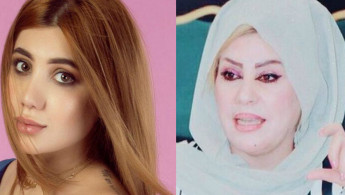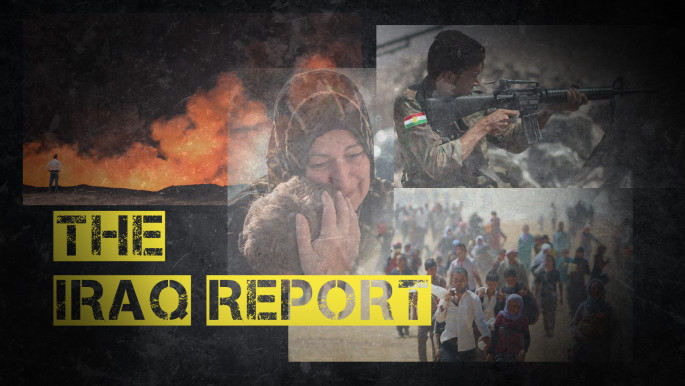The Iraq Report: Women's rights in danger after top activist and social media star assassinated
Read the full series here
This month in Iraq has been appalling for human rights in general and women's rights in particular, as a top female activist who was heavily involved in the ongoing Basra unrest was shot dead.
Another famous Iraqi beauty queen and social media influencer who has previously been outspoken on women's rights and other social issues was also gunned down in Baghdad.
Politically, Iraq is marginally closer to having a new government in place as Iran has given its blessings to the parliamentary speaker and his deputy who was elected earlier this month.
Not only are Tehran's political proxies making headway in Baghdad, but militant Shia militant groups it sponsors have been besieging Sunni Arab towns in a sectarian cleansing effort to ensure its power and influence remains unchallenged in Iraq.
Women in danger as spate of murders grips Iraq
Two prominent Iraqi women have been assassinated in the past week alone alongside other women who were believed to have been targeted by conservative militants who hold sway in Baghdad and Basra, two of Iraq's largest cities.
|
Masked gunmen shot and killed Soad al-Ali, a well-known human rights activist, outside a Basra supermarket on Tuesday in a brazen assassination that took place in broad daylight and could further inflame already fraught tensions in the restive southern city.
A police official said Ali was killed instantly by the gunmen who fled the scene after shooting at her and her husband as they were getting in their car. Ali, 46, was killed on the spot while her husband was severely wounded and was being treated in a hospital.
Ali had been heavily involved in organising anti-government protests in the Shia-dominated Basra, and had been known to call for a restoration of basic services including water and electricity, and for corrupt officials to be put on trial.
The assassination, which occurred on a street in the Abbasiya district in the centre of Basra, is the first such overt incident since protests erupted this summer, though activists have described a campaign of intimidation and arbitrary detentions by the powerful militias and political groups that control Basra, a city of more than two million people.
Some militia leaders in Basra accused protesters of colluding with the US, a favoured excuse they use when targeting any perceived anti-Iran sentiments with deadly force. Ali was pictured during a meeting she held with the US Consul General in the province of Basra, Timmy Davis, more than a month ago.
Angry Basra residents have repeatedly taken to the streets in recent weeks to protest failing government services, including water contamination that sent tens of thousands to hospitals. A top Iraqi football team from Baghdad were hospitalised and unable to kick off the new season after they suffered water poisoning just from showering in Basra's contaminated water.
Ali was tragically not the final victim of violence against women in Iraq this week as a renowned Iraqi beauty queen and social media sensation, Tara Fares, was gunned down in her car by unknown assailants on Thursday.
|
Fares had only a day earlier been voted as one of Iraq's most popular social media stars and had previously been known to comment on women's rights in her country.
Although she spent most of her time abroad or in the Kurdistan regional capital of Erbil, she was reported to have been making more regular visits to Baghdad where she ultimately met her end at the hands of masked gunmen.
Fares' killing comes as reports indicate a further two women involved in the beauty industry have been similarly shot dead, with fears that the pro-Iran Shia militants who act with impunity in both Baghdad and Basra have been targeting more liberal elements of Iraqi society.
If Iraq is to be taken seriously as a modern democracy, it must ensure that women's rights are protected and enforced.
Baghdad must take decisive action against militant groups seeking to impose their way of life by force, but most Iraqis have little faith in their government being able to rein them in as they answer to a higher power – Tehran.
 |
If Iraq is to be taken seriously as a modern democracy, it must ensure that women's rights are protected and enforced |  |
Iran makes moves to ensure it is unchallenged in Iraq
Demonstrating the level of influence and power it wields over Iraq's internal affairs, Iran earlier this month lauded Iraqi lawmakers' election of a pro-Tehran candidate to the post of parliamentary speaker.
Spokesman for Iran's foreign ministry, Bahram Ghasemi, praised the appointment of Sunni Arab Mohammed al-Halbusi as speaker and said that his country "supported Iraq's democracy" and hoped to "soon witness the election of the president and the prime minister to form a new Iraqi government".
 |
|
| Mohammed al-Halbusi (L), newly elected speaker of the Iraqi Parliament, delivers a speech on September 18 following a meeting in Basra [Getty] |
In post-2003 Iraq, the speaker is always a Sunni Arab, the prime minister a Shia Arab, and the president a Kurd. This was instituted by the US occupation following the ouster of long-time strongman Saddam Hussein, and was claimed to have been implemented to prevent one ethno-sectarian group entirely dominating the political scene.
However, many Iraqis are critical of the muhasasa system, as it is known in Arabic, as they argue it breeds – and does not resolve – ethno-sectarian conflict.
Although a Sunni Arab – the demographic most negatively affected by Iranian Shia Islamist proxies – Halbusi has been close to the Baghdad authorities and Iranian influencers such as top Islamic Revolutionary Guard Corps (IRGC) commander Qassem Soleimani.
Halbusi was formerly a governor of the Sunni Arab-majority Anbar governorate, and took a hardline stance against anti-government activists.
This earned him a position amongst the staunchly pro-Iran Conquest Alliance bloc led by known Shia jihadist and Tehran loyalist Hadi al-Ameri.
Ameri – a commander in the Shia-dominated Popular Mobilisation Forces (PMF) that has been accused of war crimes against Sunni Arabs – has himself stood down from his candidacy for the post of prime minister.
After his candidate Halbusi was elected as speaker, Ameri withdrew his candidacy and made specific reference to Iranian Supreme Leader Ali Khamenei as a reason behind his decision to stand down.
"I would like to announce to the dear Iraqi people the withdrawal of my candidacy for prime minister, to open the way for serious dialogue to elect a prime minister and his government according to the vision of the (Shia) supreme religious authority," Ameri said in a press conference.
Ameri and other Shia Islamists loyal to Tehran view Khamenei as their main religious authority who exercises both spiritual and temporal power.
Meanwhile, the PMF has been busy continuing a sectarian cleansing campaign that has been ongoing since before the Islamic State group burst onto the scene and conquered a third of Iraq in 2014.
The village of al-Mukhaysa, in the east of the Iraqi province of Diyala, is on the verge of a disaster, after being cut off by a siege enforced by the Shia organisation.
 |
These events and other signs all point to an Iranian play that will ultimately see Tehran's preferred candidates in power in Baghdad who will ensure pro-Iran militant groups continue to operate unchecked |  |
The PMF have cut off the roads and prevented the arrival of food and medicine to the town, in what has been described by locals as an attempt "to force demographic change".
"The militia factions have besieged the village for 20 days, cutting off all roads. The reasons and motives for the siege is not known, and people will die due to lack of food and medicine," a provincial official told The New Arab.
"Local officials have applied pressure to lift the siege on the village, but the militias and the political parties who back them refuse to do so," he said. He added that the continuation of the siege threatens a "humanitarian disaster in the town".
Raad al-Dahlikia, the province's member of parliament, agreed.
"Political forces have been sending reassuring messages, but there are still parties working to destabilise the internal security of Iraq, and what is happening in the village of al-Mukhaysa shows it may join Basra in a new spiral of violence," he said.
These events and other signs all point to an Iranian play that will ultimately see Tehran's preferred candidates in power in Baghdad who will ensure pro-Iran militant groups continue to operate unchecked.
This is a pattern that will be all too familiar to most Iraqis who have lived under the rule of politicians who are very close to Iran since 2003.




